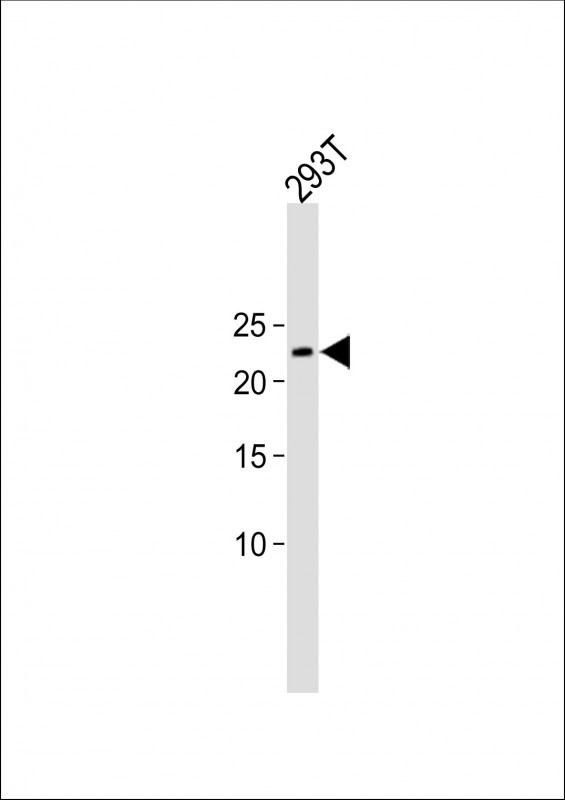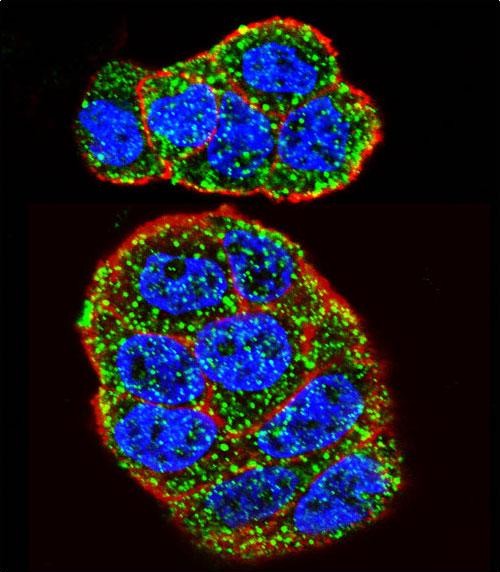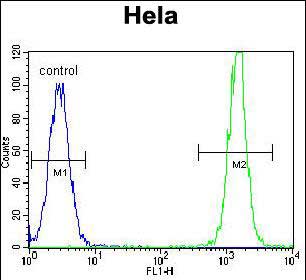KRAS Antibody (C-term)
Affinity Purified Rabbit Polyclonal Antibody (Pab)
- 产品详情
- 实验流程
- 背景知识
Application
| WB, IF, FC, E |
|---|---|
| Primary Accession | P01116 |
| Other Accession | P08644, P32883, NP_203524.1, NP_004976.2 |
| Reactivity | Human, Mouse, Rat |
| Predicted | Rat |
| Host | Rabbit |
| Clonality | Polyclonal |
| Isotype | Rabbit IgG |
| Calculated MW | 21656 Da |
| Antigen Region | 146-174 aa |
| Gene ID | 3845 |
|---|---|
| Other Names | GTPase KRas, K-Ras 2, Ki-Ras, c-K-ras, c-Ki-ras, GTPase KRas, N-terminally processed, KRAS, KRAS2, RASK2 |
| Target/Specificity | This KRAS antibody is generated from rabbits immunized with a KLH conjugated synthetic peptide between 146-174 amino acids from the C-terminal region of human KRAS. |
| Dilution | WB~~1:500 IF~~1:10~50 FC~~1:10~50 E~~Use at an assay dependent concentration. |
| Format | Purified polyclonal antibody supplied in PBS with 0.05% (V/V) Proclin 300. This antibody is purified through a protein A column, followed by peptide affinity purification. |
| Storage | Maintain refrigerated at 2-8°C for up to 2 weeks. For long term storage store at -20°C in small aliquots to prevent freeze-thaw cycles. |
| Precautions | KRAS Antibody (C-term) is for research use only and not for use in diagnostic or therapeutic procedures. |
| Name | KRAS |
|---|---|
| Synonyms | KRAS2, RASK2 |
| Function | Ras proteins bind GDP/GTP and possess intrinsic GTPase activity (PubMed:20949621, PubMed:39809765). Plays an important role in the regulation of cell proliferation (PubMed:22711838, PubMed:23698361). Plays a role in promoting oncogenic events by inducing transcriptional silencing of tumor suppressor genes (TSGs) in colorectal cancer (CRC) cells in a ZNF304-dependent manner (PubMed:24623306). |
| Cellular Location | Cell membrane; Lipid-anchor; Cytoplasmic side. Endomembrane system. Cytoplasm, cytosol |
For Research Use Only. Not For Use In Diagnostic Procedures.
Provided below are standard protocols that you may find useful for product applications.
BACKGROUND
This gene, a Kirsten ras oncogene homolog from the mammalian ras gene family, encodes a protein that is a member of the small GTPase superfamily. A single amino acid substitution is responsible for an activating mutation. The transforming protein that results is implicated in various malignancies, including lung adenocarcinoma, mucinous adenoma, ductal carcinoma of the pancreas and colorectal carcinoma. Alternative splicing leads to variants encoding two isoforms that differ in the C-terminal region.
REFERENCES
Bruckman, K.C., et al. Oral Surg Oral Med Oral Pathol Oral Radiol Endod 110(5):632-637(2010)
Wong, K.K., et al. Am. J. Pathol. 177(4):1611-1617(2010)
Irahara, N., et al. Diagn. Mol. Pathol. 19(3):157-163(2010)
Carotenuto, P., et al. Pharmacogenomics 11(8):1169-1179(2010)
Leventopoulos, G., et al. Clin. Exp. Rheumatol. 28(4):556-557(2010)
终于等到您。ABCEPTA(百远生物)抗体产品。
点击下方“我要评价 ”按钮提交您的反馈信息,您的反馈和评价是我们最宝贵的财富之一,
我们将在1-3个工作日内处理您的反馈信息。
如有疑问,联系:0512-88856768 tech-china@abcepta.com.























 癌症的基本特征包括细胞增殖、血管生成、迁移、凋亡逃避机制和细胞永生等。找到癌症发生过程中这些通路的关键标记物和对应的抗体用于检测至关重要。
癌症的基本特征包括细胞增殖、血管生成、迁移、凋亡逃避机制和细胞永生等。找到癌症发生过程中这些通路的关键标记物和对应的抗体用于检测至关重要。 为您推荐一个泛素化位点预测神器——泛素化分析工具,可以为您的蛋白的泛素化位点作出预测和评分。
为您推荐一个泛素化位点预测神器——泛素化分析工具,可以为您的蛋白的泛素化位点作出预测和评分。 细胞自噬受体图形绘图工具为你的蛋白的细胞受体结合位点作出预测和评分,识别结合到自噬通路中的蛋白是非常重要的,便于让我们理解自噬在正常生理、病理过程中的作用,如发育、细胞分化、神经退化性疾病、压力条件下、感染和癌症。
细胞自噬受体图形绘图工具为你的蛋白的细胞受体结合位点作出预测和评分,识别结合到自噬通路中的蛋白是非常重要的,便于让我们理解自噬在正常生理、病理过程中的作用,如发育、细胞分化、神经退化性疾病、压力条件下、感染和癌症。








